Dissertation Proposal: Tesco and Corporate Social Responsibility
VerifiedAdded on 2023/04/21
|15
|3873
|491
AI Summary
This dissertation proposal investigates the relationship between Corporate Social Responsibility (CSR) and profit maximization, focusing on Tesco PLC. It outlines the research background, problem statement, aims, and objectives, including assessing conceptual understandings of CSR, addressing its impact on profit maximization, and recommending CSR implementation strategies for Tesco. The proposal details a qualitative research method employing interpretivism research philosophy and an inductive approach. It includes a literature review discussing the benefits and costs of CSR, Tesco's application of CSR initiatives, and the Gantt methodology for project management, ensuring ethical research practices and proper citation. The study utilizes secondary data from journal articles, academic publications, and company reports to develop a theoretical understanding of CSR's role in Tesco's profit maximization.
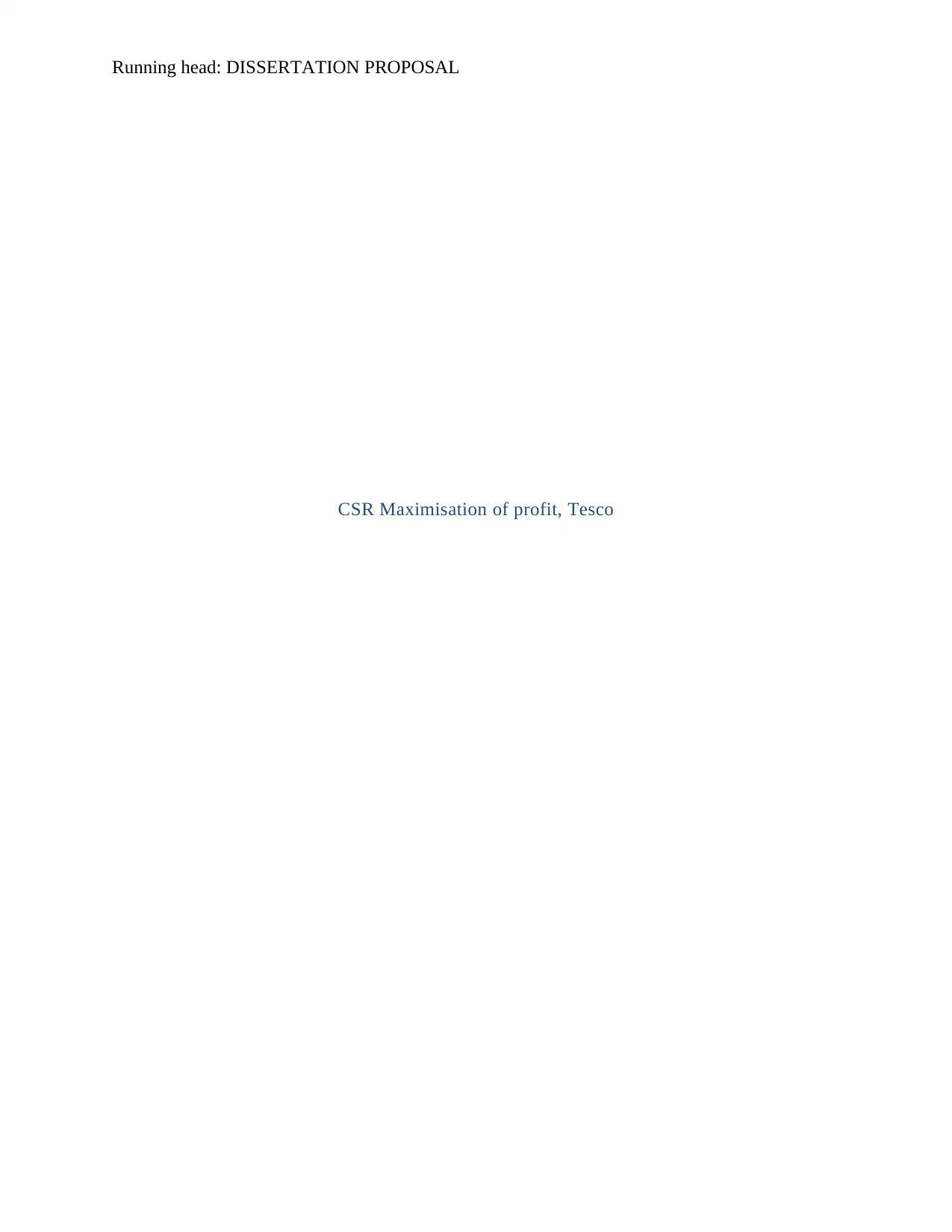
Running head: DISSERTATION PROPOSAL
CSR Maximisation of profit, Tesco
CSR Maximisation of profit, Tesco
Paraphrase This Document
Need a fresh take? Get an instant paraphrase of this document with our AI Paraphraser
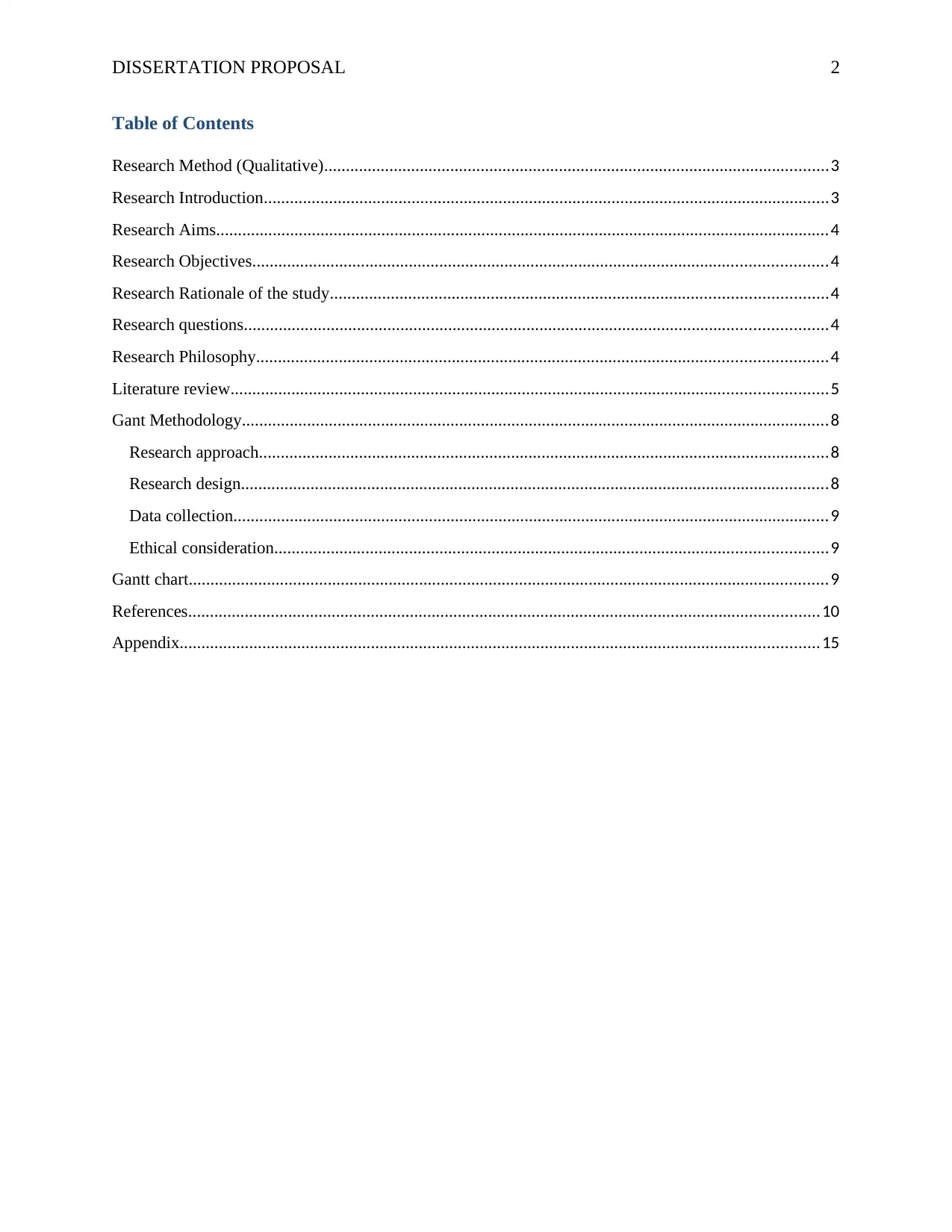
DISSERTATION PROPOSAL 2
Table of Contents
Research Method (Qualitative)....................................................................................................................3
Research Introduction..................................................................................................................................3
Research Aims.............................................................................................................................................4
Research Objectives....................................................................................................................................4
Research Rationale of the study..................................................................................................................4
Research questions......................................................................................................................................4
Research Philosophy...................................................................................................................................4
Literature review.........................................................................................................................................5
Gant Methodology.......................................................................................................................................8
Research approach...................................................................................................................................8
Research design.......................................................................................................................................8
Data collection.........................................................................................................................................9
Ethical consideration...............................................................................................................................9
Gantt chart...................................................................................................................................................9
References.................................................................................................................................................10
Appendix...................................................................................................................................................15
Table of Contents
Research Method (Qualitative)....................................................................................................................3
Research Introduction..................................................................................................................................3
Research Aims.............................................................................................................................................4
Research Objectives....................................................................................................................................4
Research Rationale of the study..................................................................................................................4
Research questions......................................................................................................................................4
Research Philosophy...................................................................................................................................4
Literature review.........................................................................................................................................5
Gant Methodology.......................................................................................................................................8
Research approach...................................................................................................................................8
Research design.......................................................................................................................................8
Data collection.........................................................................................................................................9
Ethical consideration...............................................................................................................................9
Gantt chart...................................................................................................................................................9
References.................................................................................................................................................10
Appendix...................................................................................................................................................15
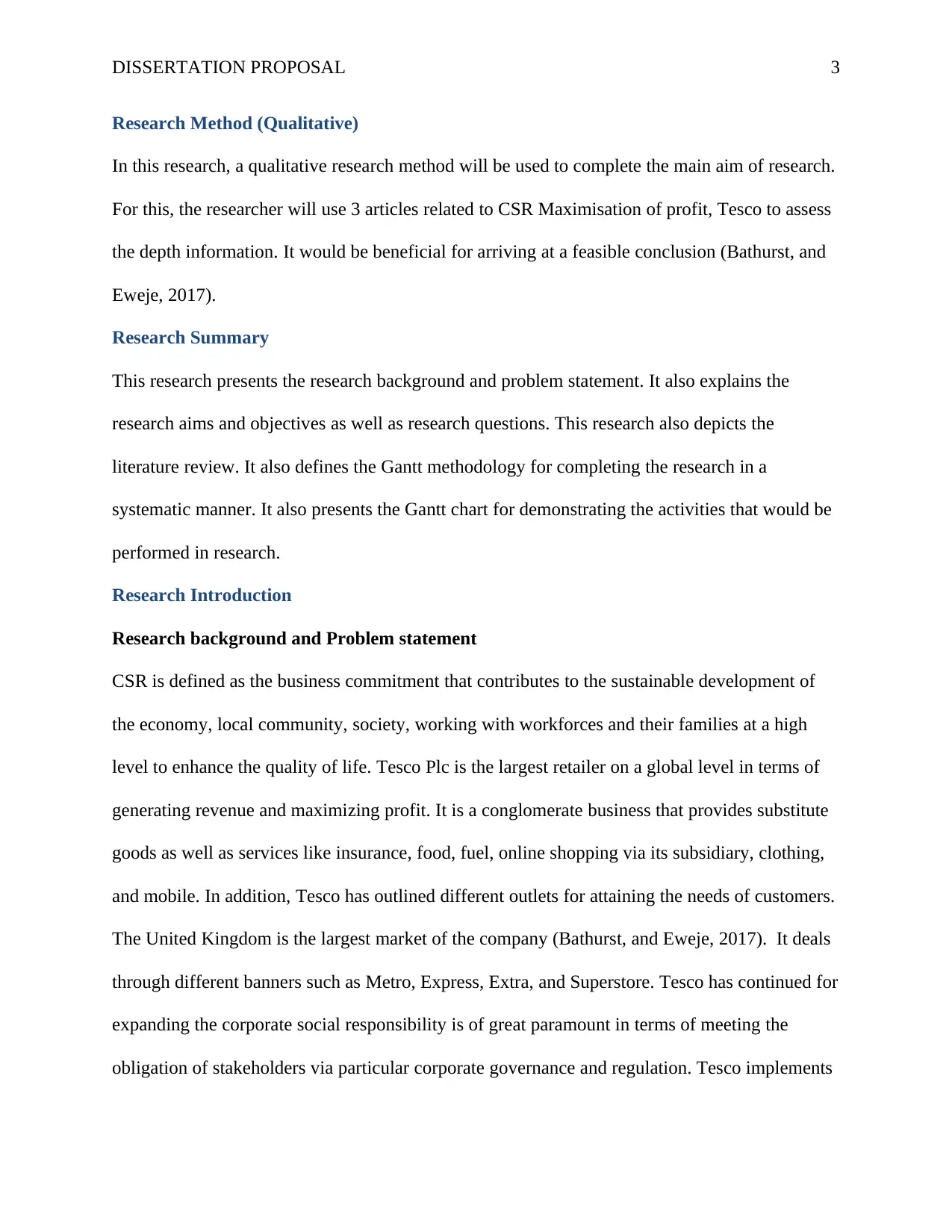
DISSERTATION PROPOSAL 3
Research Method (Qualitative)
In this research, a qualitative research method will be used to complete the main aim of research.
For this, the researcher will use 3 articles related to CSR Maximisation of profit, Tesco to assess
the depth information. It would be beneficial for arriving at a feasible conclusion (Bathurst, and
Eweje, 2017).
Research Summary
This research presents the research background and problem statement. It also explains the
research aims and objectives as well as research questions. This research also depicts the
literature review. It also defines the Gantt methodology for completing the research in a
systematic manner. It also presents the Gantt chart for demonstrating the activities that would be
performed in research.
Research Introduction
Research background and Problem statement
CSR is defined as the business commitment that contributes to the sustainable development of
the economy, local community, society, working with workforces and their families at a high
level to enhance the quality of life. Tesco Plc is the largest retailer on a global level in terms of
generating revenue and maximizing profit. It is a conglomerate business that provides substitute
goods as well as services like insurance, food, fuel, online shopping via its subsidiary, clothing,
and mobile. In addition, Tesco has outlined different outlets for attaining the needs of customers.
The United Kingdom is the largest market of the company (Bathurst, and Eweje, 2017). It deals
through different banners such as Metro, Express, Extra, and Superstore. Tesco has continued for
expanding the corporate social responsibility is of great paramount in terms of meeting the
obligation of stakeholders via particular corporate governance and regulation. Tesco implements
Research Method (Qualitative)
In this research, a qualitative research method will be used to complete the main aim of research.
For this, the researcher will use 3 articles related to CSR Maximisation of profit, Tesco to assess
the depth information. It would be beneficial for arriving at a feasible conclusion (Bathurst, and
Eweje, 2017).
Research Summary
This research presents the research background and problem statement. It also explains the
research aims and objectives as well as research questions. This research also depicts the
literature review. It also defines the Gantt methodology for completing the research in a
systematic manner. It also presents the Gantt chart for demonstrating the activities that would be
performed in research.
Research Introduction
Research background and Problem statement
CSR is defined as the business commitment that contributes to the sustainable development of
the economy, local community, society, working with workforces and their families at a high
level to enhance the quality of life. Tesco Plc is the largest retailer on a global level in terms of
generating revenue and maximizing profit. It is a conglomerate business that provides substitute
goods as well as services like insurance, food, fuel, online shopping via its subsidiary, clothing,
and mobile. In addition, Tesco has outlined different outlets for attaining the needs of customers.
The United Kingdom is the largest market of the company (Bathurst, and Eweje, 2017). It deals
through different banners such as Metro, Express, Extra, and Superstore. Tesco has continued for
expanding the corporate social responsibility is of great paramount in terms of meeting the
obligation of stakeholders via particular corporate governance and regulation. Tesco implements
⊘ This is a preview!⊘
Do you want full access?
Subscribe today to unlock all pages.

Trusted by 1+ million students worldwide
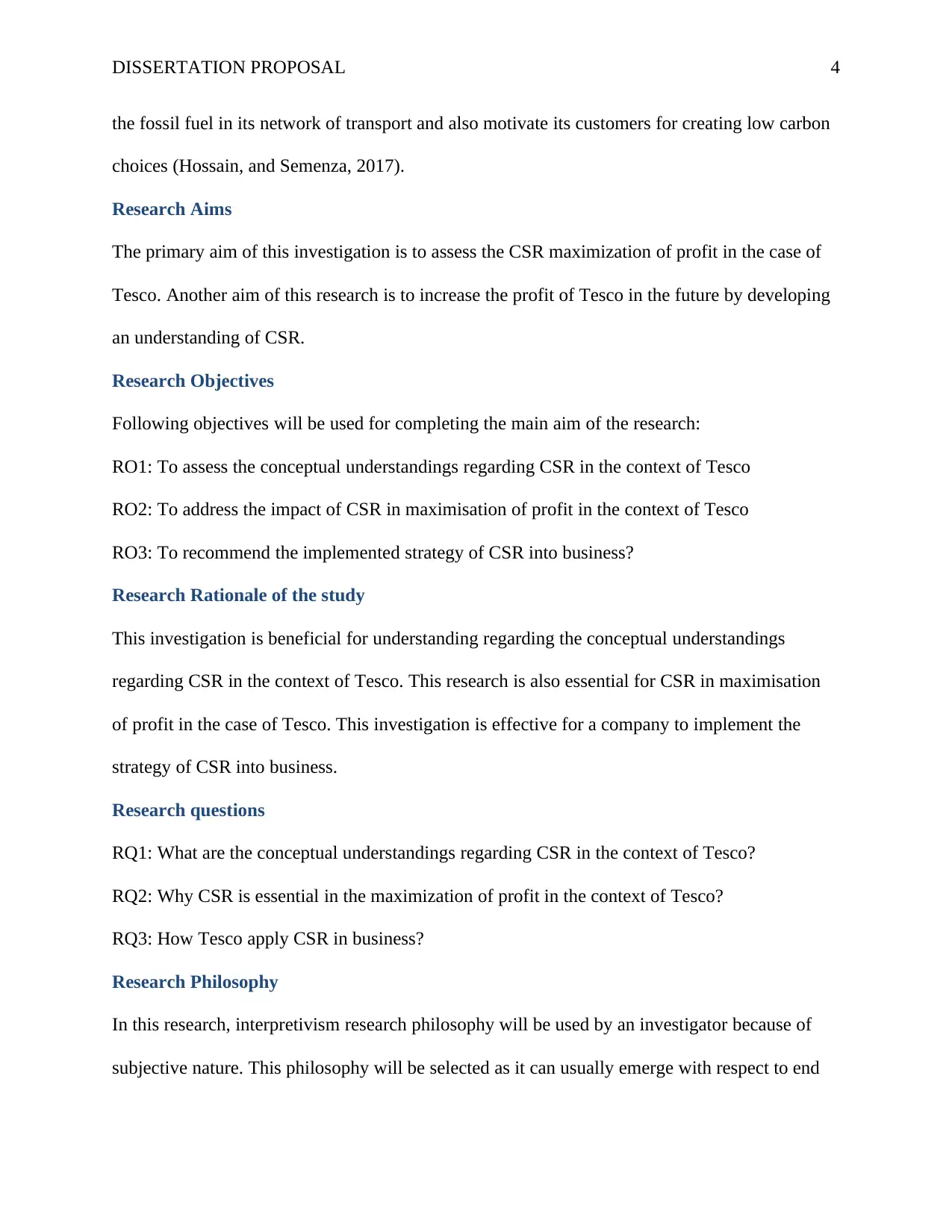
DISSERTATION PROPOSAL 4
the fossil fuel in its network of transport and also motivate its customers for creating low carbon
choices (Hossain, and Semenza, 2017).
Research Aims
The primary aim of this investigation is to assess the CSR maximization of profit in the case of
Tesco. Another aim of this research is to increase the profit of Tesco in the future by developing
an understanding of CSR.
Research Objectives
Following objectives will be used for completing the main aim of the research:
RO1: To assess the conceptual understandings regarding CSR in the context of Tesco
RO2: To address the impact of CSR in maximisation of profit in the context of Tesco
RO3: To recommend the implemented strategy of CSR into business?
Research Rationale of the study
This investigation is beneficial for understanding regarding the conceptual understandings
regarding CSR in the context of Tesco. This research is also essential for CSR in maximisation
of profit in the case of Tesco. This investigation is effective for a company to implement the
strategy of CSR into business.
Research questions
RQ1: What are the conceptual understandings regarding CSR in the context of Tesco?
RQ2: Why CSR is essential in the maximization of profit in the context of Tesco?
RQ3: How Tesco apply CSR in business?
Research Philosophy
In this research, interpretivism research philosophy will be used by an investigator because of
subjective nature. This philosophy will be selected as it can usually emerge with respect to end
the fossil fuel in its network of transport and also motivate its customers for creating low carbon
choices (Hossain, and Semenza, 2017).
Research Aims
The primary aim of this investigation is to assess the CSR maximization of profit in the case of
Tesco. Another aim of this research is to increase the profit of Tesco in the future by developing
an understanding of CSR.
Research Objectives
Following objectives will be used for completing the main aim of the research:
RO1: To assess the conceptual understandings regarding CSR in the context of Tesco
RO2: To address the impact of CSR in maximisation of profit in the context of Tesco
RO3: To recommend the implemented strategy of CSR into business?
Research Rationale of the study
This investigation is beneficial for understanding regarding the conceptual understandings
regarding CSR in the context of Tesco. This research is also essential for CSR in maximisation
of profit in the case of Tesco. This investigation is effective for a company to implement the
strategy of CSR into business.
Research questions
RQ1: What are the conceptual understandings regarding CSR in the context of Tesco?
RQ2: Why CSR is essential in the maximization of profit in the context of Tesco?
RQ3: How Tesco apply CSR in business?
Research Philosophy
In this research, interpretivism research philosophy will be used by an investigator because of
subjective nature. This philosophy will be selected as it can usually emerge with respect to end
Paraphrase This Document
Need a fresh take? Get an instant paraphrase of this document with our AI Paraphraser
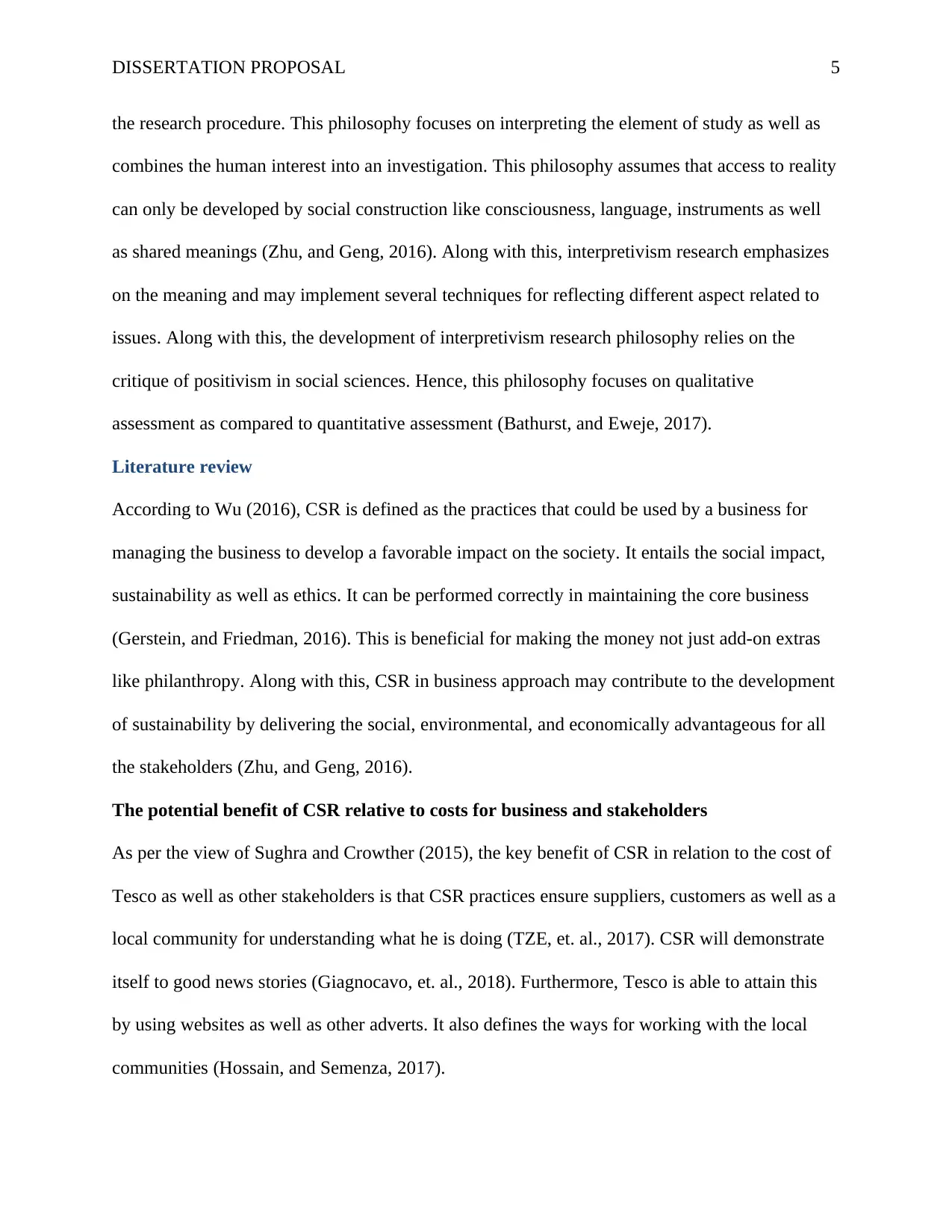
DISSERTATION PROPOSAL 5
the research procedure. This philosophy focuses on interpreting the element of study as well as
combines the human interest into an investigation. This philosophy assumes that access to reality
can only be developed by social construction like consciousness, language, instruments as well
as shared meanings (Zhu, and Geng, 2016). Along with this, interpretivism research emphasizes
on the meaning and may implement several techniques for reflecting different aspect related to
issues. Along with this, the development of interpretivism research philosophy relies on the
critique of positivism in social sciences. Hence, this philosophy focuses on qualitative
assessment as compared to quantitative assessment (Bathurst, and Eweje, 2017).
Literature review
According to Wu (2016), CSR is defined as the practices that could be used by a business for
managing the business to develop a favorable impact on the society. It entails the social impact,
sustainability as well as ethics. It can be performed correctly in maintaining the core business
(Gerstein, and Friedman, 2016). This is beneficial for making the money not just add-on extras
like philanthropy. Along with this, CSR in business approach may contribute to the development
of sustainability by delivering the social, environmental, and economically advantageous for all
the stakeholders (Zhu, and Geng, 2016).
The potential benefit of CSR relative to costs for business and stakeholders
As per the view of Sughra and Crowther (2015), the key benefit of CSR in relation to the cost of
Tesco as well as other stakeholders is that CSR practices ensure suppliers, customers as well as a
local community for understanding what he is doing (TZE, et. al., 2017). CSR will demonstrate
itself to good news stories (Giagnocavo, et. al., 2018). Furthermore, Tesco is able to attain this
by using websites as well as other adverts. It also defines the ways for working with the local
communities (Hossain, and Semenza, 2017).
the research procedure. This philosophy focuses on interpreting the element of study as well as
combines the human interest into an investigation. This philosophy assumes that access to reality
can only be developed by social construction like consciousness, language, instruments as well
as shared meanings (Zhu, and Geng, 2016). Along with this, interpretivism research emphasizes
on the meaning and may implement several techniques for reflecting different aspect related to
issues. Along with this, the development of interpretivism research philosophy relies on the
critique of positivism in social sciences. Hence, this philosophy focuses on qualitative
assessment as compared to quantitative assessment (Bathurst, and Eweje, 2017).
Literature review
According to Wu (2016), CSR is defined as the practices that could be used by a business for
managing the business to develop a favorable impact on the society. It entails the social impact,
sustainability as well as ethics. It can be performed correctly in maintaining the core business
(Gerstein, and Friedman, 2016). This is beneficial for making the money not just add-on extras
like philanthropy. Along with this, CSR in business approach may contribute to the development
of sustainability by delivering the social, environmental, and economically advantageous for all
the stakeholders (Zhu, and Geng, 2016).
The potential benefit of CSR relative to costs for business and stakeholders
As per the view of Sughra and Crowther (2015), the key benefit of CSR in relation to the cost of
Tesco as well as other stakeholders is that CSR practices ensure suppliers, customers as well as a
local community for understanding what he is doing (TZE, et. al., 2017). CSR will demonstrate
itself to good news stories (Giagnocavo, et. al., 2018). Furthermore, Tesco is able to attain this
by using websites as well as other adverts. It also defines the ways for working with the local
communities (Hossain, and Semenza, 2017).
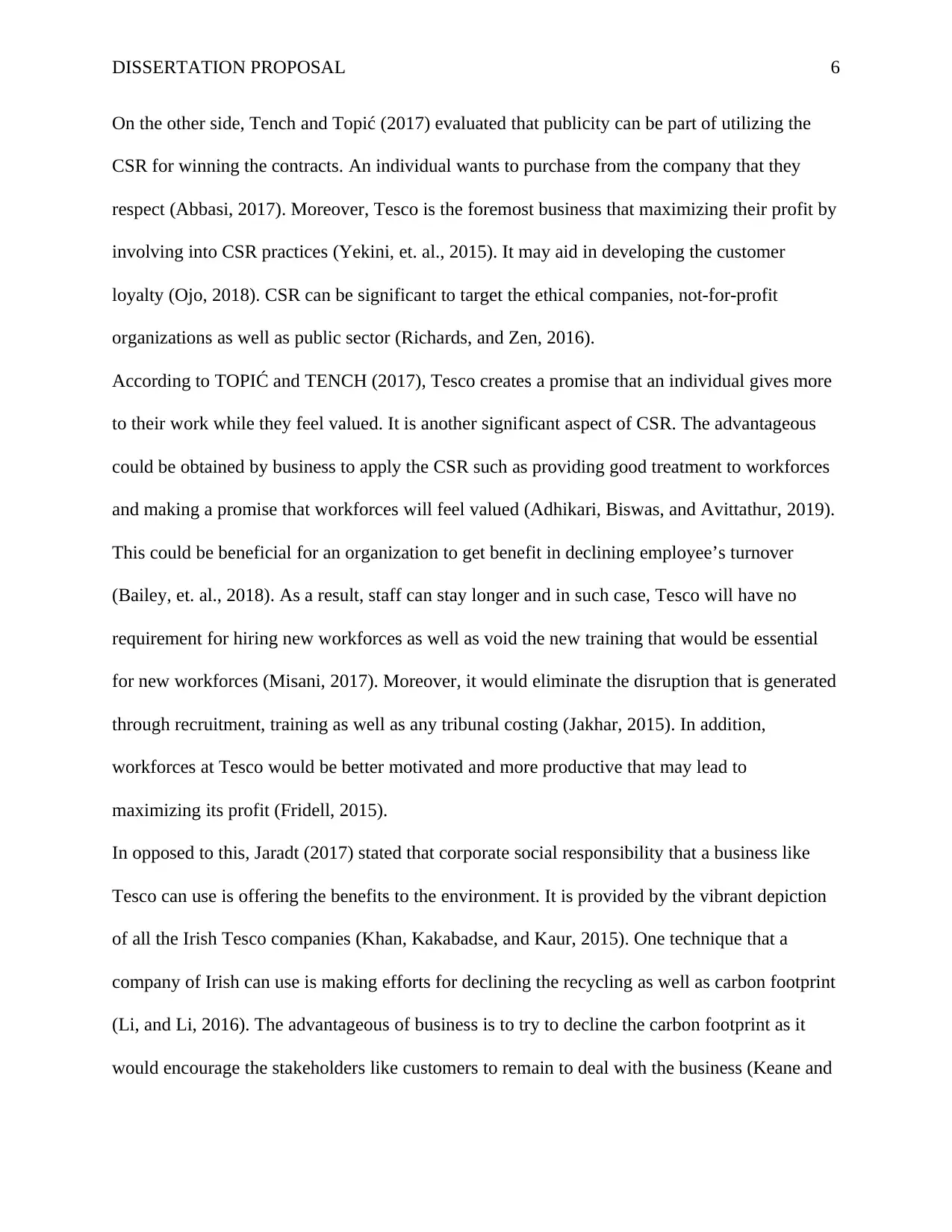
DISSERTATION PROPOSAL 6
On the other side, Tench and Topić (2017) evaluated that publicity can be part of utilizing the
CSR for winning the contracts. An individual wants to purchase from the company that they
respect (Abbasi, 2017). Moreover, Tesco is the foremost business that maximizing their profit by
involving into CSR practices (Yekini, et. al., 2015). It may aid in developing the customer
loyalty (Ojo, 2018). CSR can be significant to target the ethical companies, not-for-profit
organizations as well as public sector (Richards, and Zen, 2016).
According to TOPIĆ and TENCH (2017), Tesco creates a promise that an individual gives more
to their work while they feel valued. It is another significant aspect of CSR. The advantageous
could be obtained by business to apply the CSR such as providing good treatment to workforces
and making a promise that workforces will feel valued (Adhikari, Biswas, and Avittathur, 2019).
This could be beneficial for an organization to get benefit in declining employee’s turnover
(Bailey, et. al., 2018). As a result, staff can stay longer and in such case, Tesco will have no
requirement for hiring new workforces as well as void the new training that would be essential
for new workforces (Misani, 2017). Moreover, it would eliminate the disruption that is generated
through recruitment, training as well as any tribunal costing (Jakhar, 2015). In addition,
workforces at Tesco would be better motivated and more productive that may lead to
maximizing its profit (Fridell, 2015).
In opposed to this, Jaradt (2017) stated that corporate social responsibility that a business like
Tesco can use is offering the benefits to the environment. It is provided by the vibrant depiction
of all the Irish Tesco companies (Khan, Kakabadse, and Kaur, 2015). One technique that a
company of Irish can use is making efforts for declining the recycling as well as carbon footprint
(Li, and Li, 2016). The advantageous of business is to try to decline the carbon footprint as it
would encourage the stakeholders like customers to remain to deal with the business (Keane and
On the other side, Tench and Topić (2017) evaluated that publicity can be part of utilizing the
CSR for winning the contracts. An individual wants to purchase from the company that they
respect (Abbasi, 2017). Moreover, Tesco is the foremost business that maximizing their profit by
involving into CSR practices (Yekini, et. al., 2015). It may aid in developing the customer
loyalty (Ojo, 2018). CSR can be significant to target the ethical companies, not-for-profit
organizations as well as public sector (Richards, and Zen, 2016).
According to TOPIĆ and TENCH (2017), Tesco creates a promise that an individual gives more
to their work while they feel valued. It is another significant aspect of CSR. The advantageous
could be obtained by business to apply the CSR such as providing good treatment to workforces
and making a promise that workforces will feel valued (Adhikari, Biswas, and Avittathur, 2019).
This could be beneficial for an organization to get benefit in declining employee’s turnover
(Bailey, et. al., 2018). As a result, staff can stay longer and in such case, Tesco will have no
requirement for hiring new workforces as well as void the new training that would be essential
for new workforces (Misani, 2017). Moreover, it would eliminate the disruption that is generated
through recruitment, training as well as any tribunal costing (Jakhar, 2015). In addition,
workforces at Tesco would be better motivated and more productive that may lead to
maximizing its profit (Fridell, 2015).
In opposed to this, Jaradt (2017) stated that corporate social responsibility that a business like
Tesco can use is offering the benefits to the environment. It is provided by the vibrant depiction
of all the Irish Tesco companies (Khan, Kakabadse, and Kaur, 2015). One technique that a
company of Irish can use is making efforts for declining the recycling as well as carbon footprint
(Li, and Li, 2016). The advantageous of business is to try to decline the carbon footprint as it
would encourage the stakeholders like customers to remain to deal with the business (Keane and
⊘ This is a preview!⊘
Do you want full access?
Subscribe today to unlock all pages.

Trusted by 1+ million students worldwide
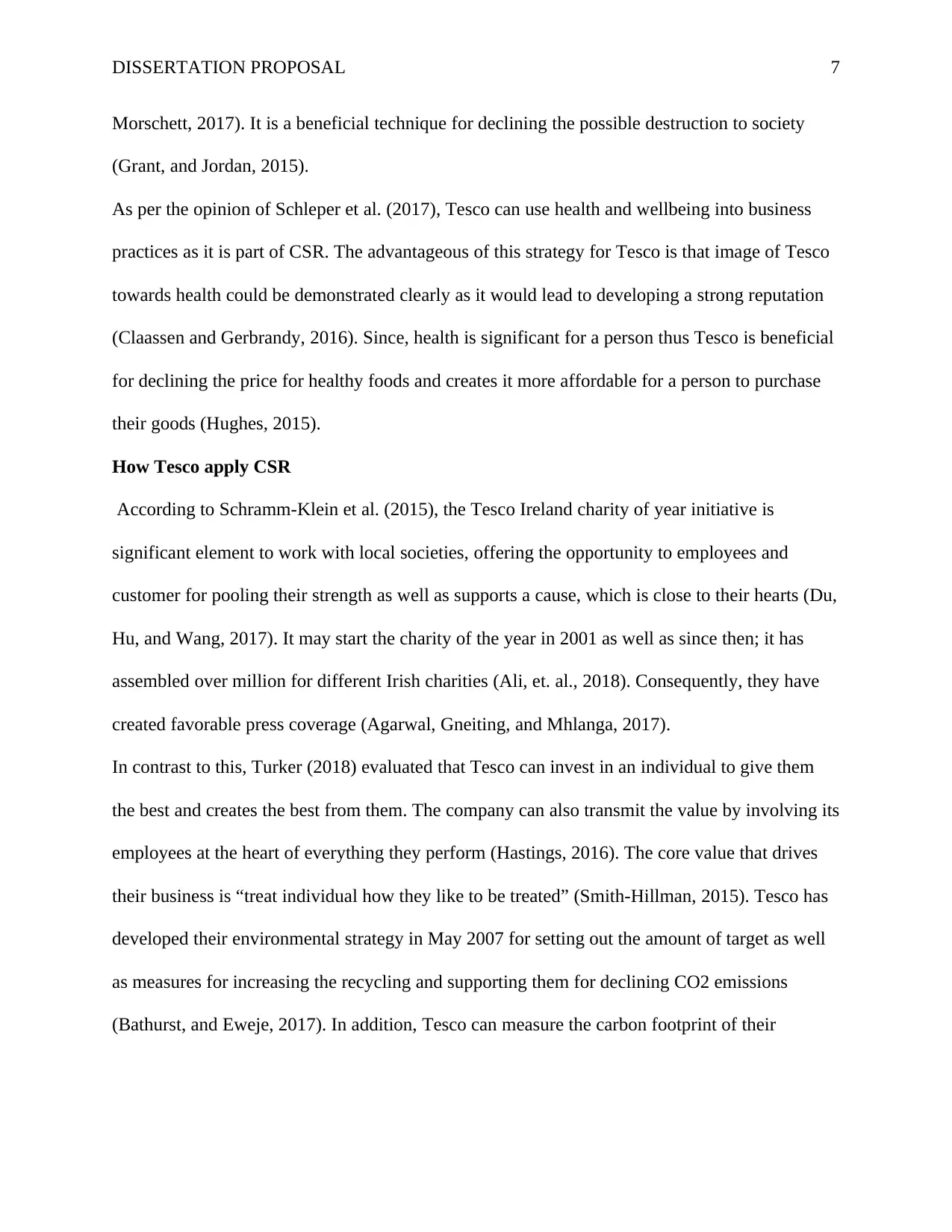
DISSERTATION PROPOSAL 7
Morschett, 2017). It is a beneficial technique for declining the possible destruction to society
(Grant, and Jordan, 2015).
As per the opinion of Schleper et al. (2017), Tesco can use health and wellbeing into business
practices as it is part of CSR. The advantageous of this strategy for Tesco is that image of Tesco
towards health could be demonstrated clearly as it would lead to developing a strong reputation
(Claassen and Gerbrandy, 2016). Since, health is significant for a person thus Tesco is beneficial
for declining the price for healthy foods and creates it more affordable for a person to purchase
their goods (Hughes, 2015).
How Tesco apply CSR
According to Schramm-Klein et al. (2015), the Tesco Ireland charity of year initiative is
significant element to work with local societies, offering the opportunity to employees and
customer for pooling their strength as well as supports a cause, which is close to their hearts (Du,
Hu, and Wang, 2017). It may start the charity of the year in 2001 as well as since then; it has
assembled over million for different Irish charities (Ali, et. al., 2018). Consequently, they have
created favorable press coverage (Agarwal, Gneiting, and Mhlanga, 2017).
In contrast to this, Turker (2018) evaluated that Tesco can invest in an individual to give them
the best and creates the best from them. The company can also transmit the value by involving its
employees at the heart of everything they perform (Hastings, 2016). The core value that drives
their business is “treat individual how they like to be treated” (Smith-Hillman, 2015). Tesco has
developed their environmental strategy in May 2007 for setting out the amount of target as well
as measures for increasing the recycling and supporting them for declining CO2 emissions
(Bathurst, and Eweje, 2017). In addition, Tesco can measure the carbon footprint of their
Morschett, 2017). It is a beneficial technique for declining the possible destruction to society
(Grant, and Jordan, 2015).
As per the opinion of Schleper et al. (2017), Tesco can use health and wellbeing into business
practices as it is part of CSR. The advantageous of this strategy for Tesco is that image of Tesco
towards health could be demonstrated clearly as it would lead to developing a strong reputation
(Claassen and Gerbrandy, 2016). Since, health is significant for a person thus Tesco is beneficial
for declining the price for healthy foods and creates it more affordable for a person to purchase
their goods (Hughes, 2015).
How Tesco apply CSR
According to Schramm-Klein et al. (2015), the Tesco Ireland charity of year initiative is
significant element to work with local societies, offering the opportunity to employees and
customer for pooling their strength as well as supports a cause, which is close to their hearts (Du,
Hu, and Wang, 2017). It may start the charity of the year in 2001 as well as since then; it has
assembled over million for different Irish charities (Ali, et. al., 2018). Consequently, they have
created favorable press coverage (Agarwal, Gneiting, and Mhlanga, 2017).
In contrast to this, Turker (2018) evaluated that Tesco can invest in an individual to give them
the best and creates the best from them. The company can also transmit the value by involving its
employees at the heart of everything they perform (Hastings, 2016). The core value that drives
their business is “treat individual how they like to be treated” (Smith-Hillman, 2015). Tesco has
developed their environmental strategy in May 2007 for setting out the amount of target as well
as measures for increasing the recycling and supporting them for declining CO2 emissions
(Bathurst, and Eweje, 2017). In addition, Tesco can measure the carbon footprint of their
Paraphrase This Document
Need a fresh take? Get an instant paraphrase of this document with our AI Paraphraser
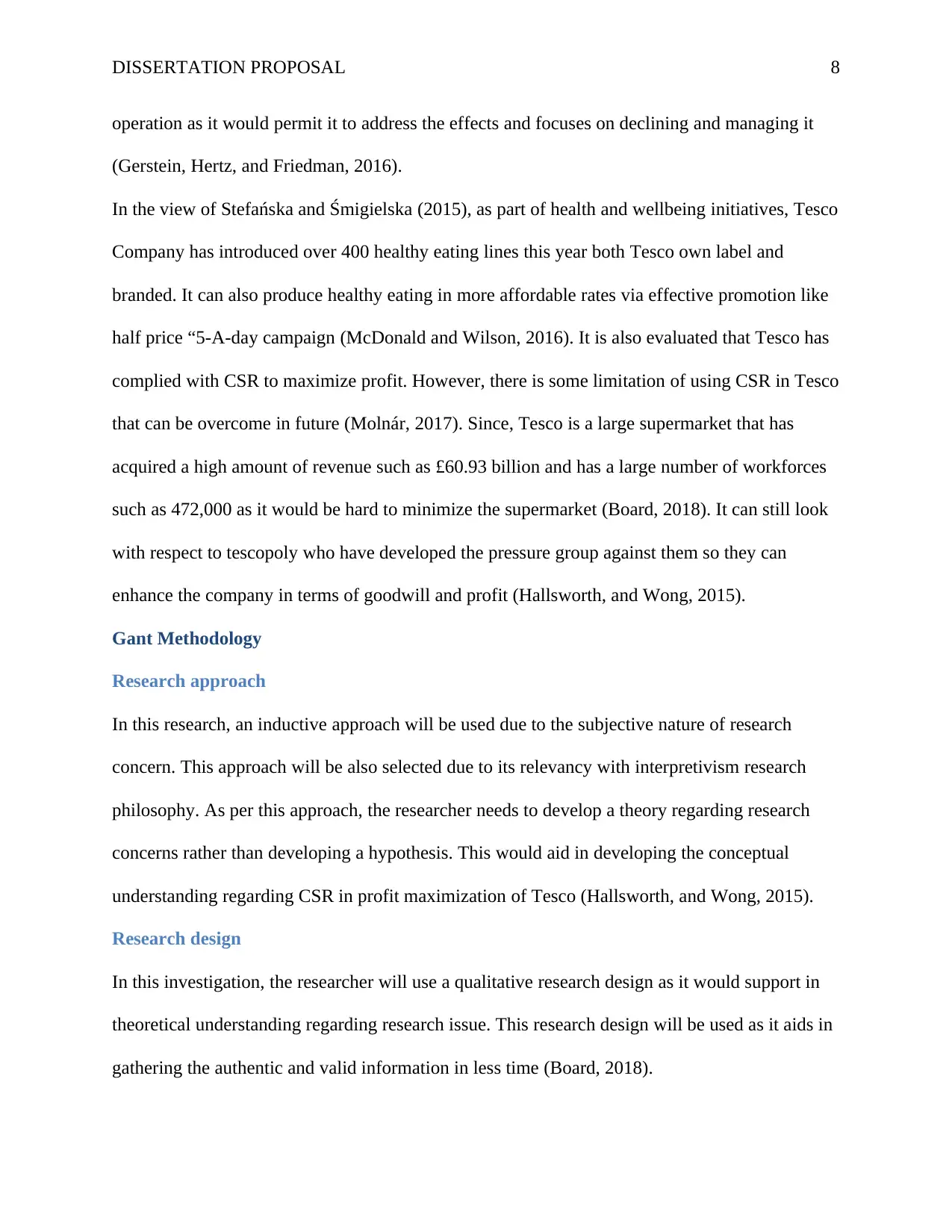
DISSERTATION PROPOSAL 8
operation as it would permit it to address the effects and focuses on declining and managing it
(Gerstein, Hertz, and Friedman, 2016).
In the view of Stefańska and Śmigielska (2015), as part of health and wellbeing initiatives, Tesco
Company has introduced over 400 healthy eating lines this year both Tesco own label and
branded. It can also produce healthy eating in more affordable rates via effective promotion like
half price “5-A-day campaign (McDonald and Wilson, 2016). It is also evaluated that Tesco has
complied with CSR to maximize profit. However, there is some limitation of using CSR in Tesco
that can be overcome in future (Molnár, 2017). Since, Tesco is a large supermarket that has
acquired a high amount of revenue such as £60.93 billion and has a large number of workforces
such as 472,000 as it would be hard to minimize the supermarket (Board, 2018). It can still look
with respect to tescopoly who have developed the pressure group against them so they can
enhance the company in terms of goodwill and profit (Hallsworth, and Wong, 2015).
Gant Methodology
Research approach
In this research, an inductive approach will be used due to the subjective nature of research
concern. This approach will be also selected due to its relevancy with interpretivism research
philosophy. As per this approach, the researcher needs to develop a theory regarding research
concerns rather than developing a hypothesis. This would aid in developing the conceptual
understanding regarding CSR in profit maximization of Tesco (Hallsworth, and Wong, 2015).
Research design
In this investigation, the researcher will use a qualitative research design as it would support in
theoretical understanding regarding research issue. This research design will be used as it aids in
gathering the authentic and valid information in less time (Board, 2018).
operation as it would permit it to address the effects and focuses on declining and managing it
(Gerstein, Hertz, and Friedman, 2016).
In the view of Stefańska and Śmigielska (2015), as part of health and wellbeing initiatives, Tesco
Company has introduced over 400 healthy eating lines this year both Tesco own label and
branded. It can also produce healthy eating in more affordable rates via effective promotion like
half price “5-A-day campaign (McDonald and Wilson, 2016). It is also evaluated that Tesco has
complied with CSR to maximize profit. However, there is some limitation of using CSR in Tesco
that can be overcome in future (Molnár, 2017). Since, Tesco is a large supermarket that has
acquired a high amount of revenue such as £60.93 billion and has a large number of workforces
such as 472,000 as it would be hard to minimize the supermarket (Board, 2018). It can still look
with respect to tescopoly who have developed the pressure group against them so they can
enhance the company in terms of goodwill and profit (Hallsworth, and Wong, 2015).
Gant Methodology
Research approach
In this research, an inductive approach will be used due to the subjective nature of research
concern. This approach will be also selected due to its relevancy with interpretivism research
philosophy. As per this approach, the researcher needs to develop a theory regarding research
concerns rather than developing a hypothesis. This would aid in developing the conceptual
understanding regarding CSR in profit maximization of Tesco (Hallsworth, and Wong, 2015).
Research design
In this investigation, the researcher will use a qualitative research design as it would support in
theoretical understanding regarding research issue. This research design will be used as it aids in
gathering the authentic and valid information in less time (Board, 2018).
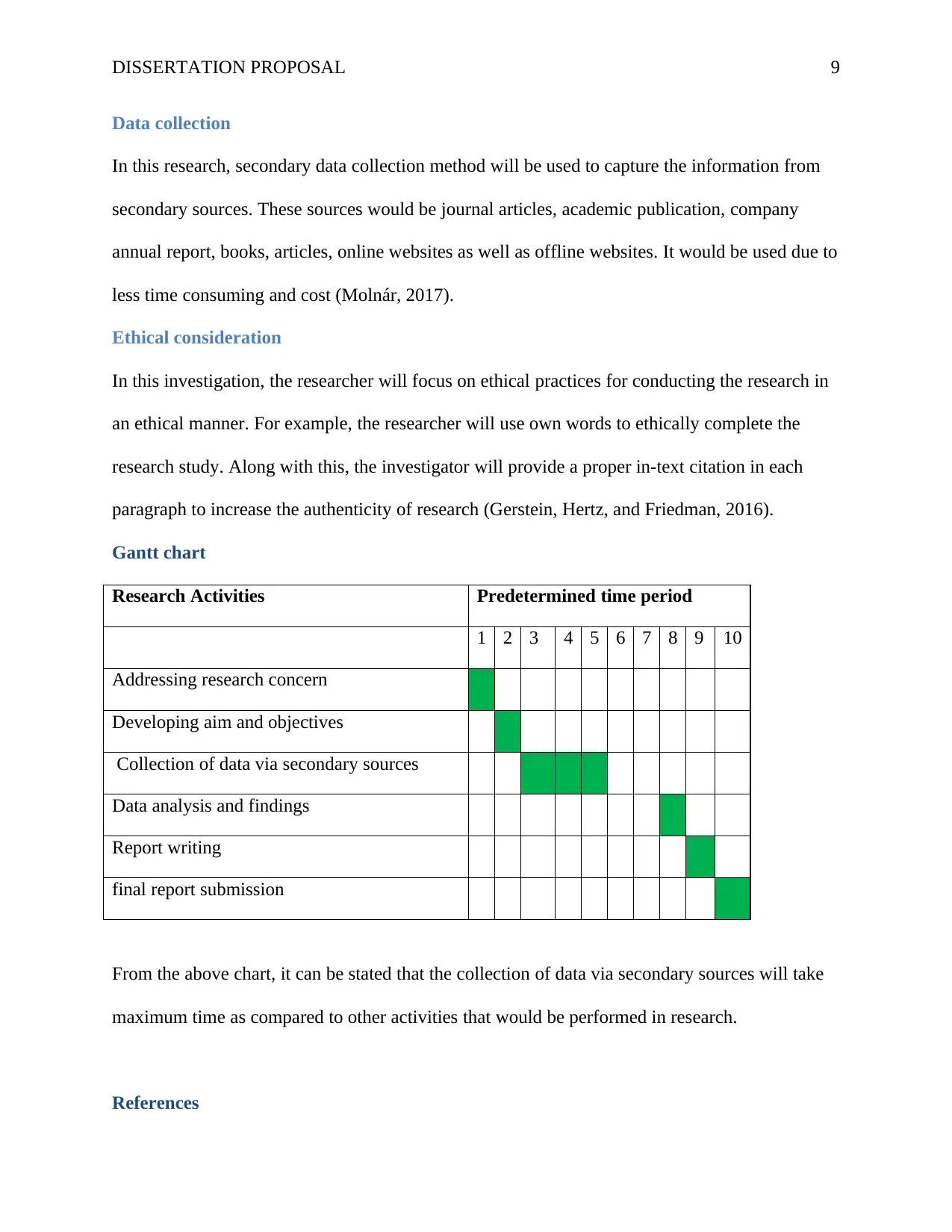
DISSERTATION PROPOSAL 9
Data collection
In this research, secondary data collection method will be used to capture the information from
secondary sources. These sources would be journal articles, academic publication, company
annual report, books, articles, online websites as well as offline websites. It would be used due to
less time consuming and cost (Molnár, 2017).
Ethical consideration
In this investigation, the researcher will focus on ethical practices for conducting the research in
an ethical manner. For example, the researcher will use own words to ethically complete the
research study. Along with this, the investigator will provide a proper in-text citation in each
paragraph to increase the authenticity of research (Gerstein, Hertz, and Friedman, 2016).
Gantt chart
Research Activities Predetermined time period
1 2 3 4 5 6 7 8 9 10
Addressing research concern
Developing aim and objectives
Collection of data via secondary sources
Data analysis and findings
Report writing
final report submission
From the above chart, it can be stated that the collection of data via secondary sources will take
maximum time as compared to other activities that would be performed in research.
References
Data collection
In this research, secondary data collection method will be used to capture the information from
secondary sources. These sources would be journal articles, academic publication, company
annual report, books, articles, online websites as well as offline websites. It would be used due to
less time consuming and cost (Molnár, 2017).
Ethical consideration
In this investigation, the researcher will focus on ethical practices for conducting the research in
an ethical manner. For example, the researcher will use own words to ethically complete the
research study. Along with this, the investigator will provide a proper in-text citation in each
paragraph to increase the authenticity of research (Gerstein, Hertz, and Friedman, 2016).
Gantt chart
Research Activities Predetermined time period
1 2 3 4 5 6 7 8 9 10
Addressing research concern
Developing aim and objectives
Collection of data via secondary sources
Data analysis and findings
Report writing
final report submission
From the above chart, it can be stated that the collection of data via secondary sources will take
maximum time as compared to other activities that would be performed in research.
References
⊘ This is a preview!⊘
Do you want full access?
Subscribe today to unlock all pages.

Trusted by 1+ million students worldwide
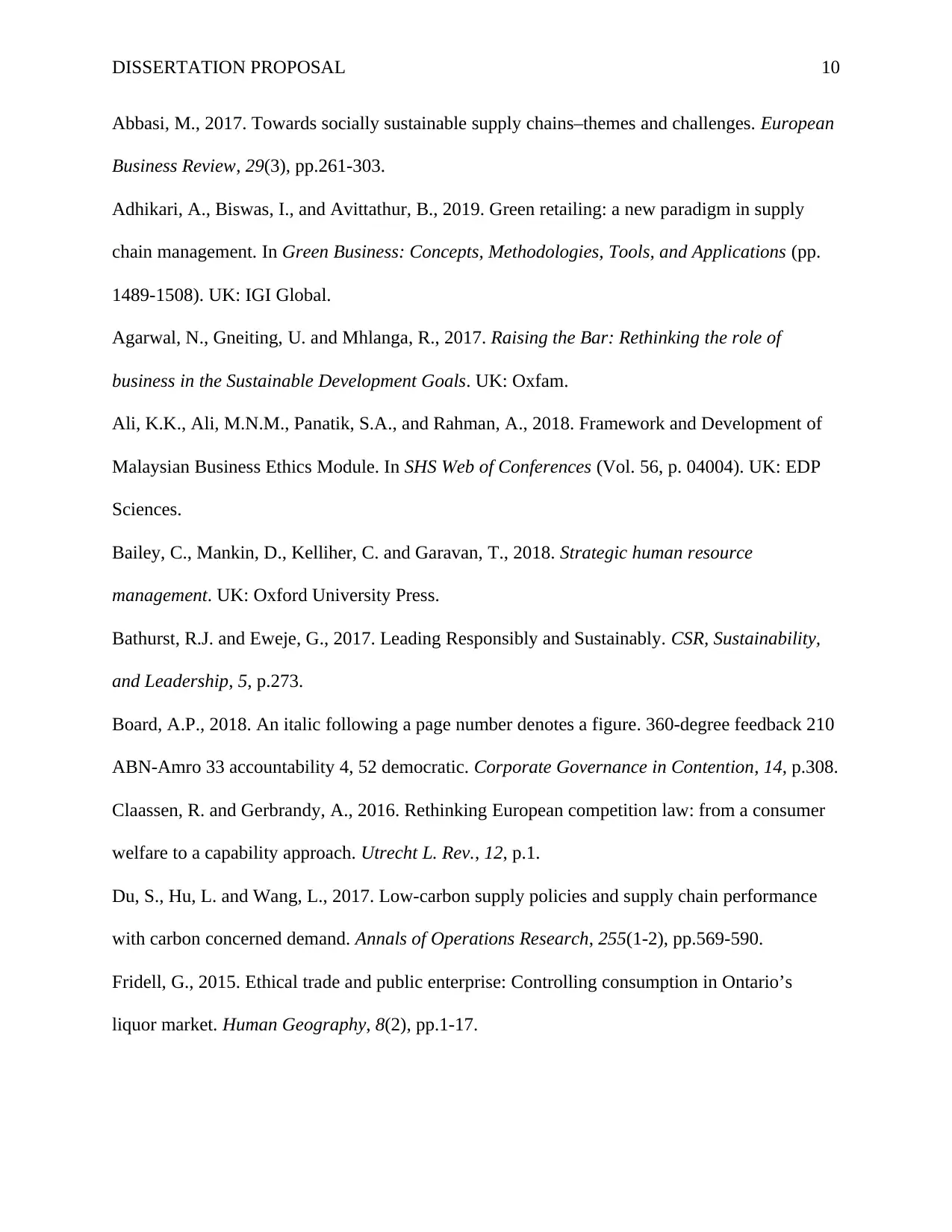
DISSERTATION PROPOSAL 10
Abbasi, M., 2017. Towards socially sustainable supply chains–themes and challenges. European
Business Review, 29(3), pp.261-303.
Adhikari, A., Biswas, I., and Avittathur, B., 2019. Green retailing: a new paradigm in supply
chain management. In Green Business: Concepts, Methodologies, Tools, and Applications (pp.
1489-1508). UK: IGI Global.
Agarwal, N., Gneiting, U. and Mhlanga, R., 2017. Raising the Bar: Rethinking the role of
business in the Sustainable Development Goals. UK: Oxfam.
Ali, K.K., Ali, M.N.M., Panatik, S.A., and Rahman, A., 2018. Framework and Development of
Malaysian Business Ethics Module. In SHS Web of Conferences (Vol. 56, p. 04004). UK: EDP
Sciences.
Bailey, C., Mankin, D., Kelliher, C. and Garavan, T., 2018. Strategic human resource
management. UK: Oxford University Press.
Bathurst, R.J. and Eweje, G., 2017. Leading Responsibly and Sustainably. CSR, Sustainability,
and Leadership, 5, p.273.
Board, A.P., 2018. An italic following a page number denotes a figure. 360-degree feedback 210
ABN-Amro 33 accountability 4, 52 democratic. Corporate Governance in Contention, 14, p.308.
Claassen, R. and Gerbrandy, A., 2016. Rethinking European competition law: from a consumer
welfare to a capability approach. Utrecht L. Rev., 12, p.1.
Du, S., Hu, L. and Wang, L., 2017. Low-carbon supply policies and supply chain performance
with carbon concerned demand. Annals of Operations Research, 255(1-2), pp.569-590.
Fridell, G., 2015. Ethical trade and public enterprise: Controlling consumption in Ontario’s
liquor market. Human Geography, 8(2), pp.1-17.
Abbasi, M., 2017. Towards socially sustainable supply chains–themes and challenges. European
Business Review, 29(3), pp.261-303.
Adhikari, A., Biswas, I., and Avittathur, B., 2019. Green retailing: a new paradigm in supply
chain management. In Green Business: Concepts, Methodologies, Tools, and Applications (pp.
1489-1508). UK: IGI Global.
Agarwal, N., Gneiting, U. and Mhlanga, R., 2017. Raising the Bar: Rethinking the role of
business in the Sustainable Development Goals. UK: Oxfam.
Ali, K.K., Ali, M.N.M., Panatik, S.A., and Rahman, A., 2018. Framework and Development of
Malaysian Business Ethics Module. In SHS Web of Conferences (Vol. 56, p. 04004). UK: EDP
Sciences.
Bailey, C., Mankin, D., Kelliher, C. and Garavan, T., 2018. Strategic human resource
management. UK: Oxford University Press.
Bathurst, R.J. and Eweje, G., 2017. Leading Responsibly and Sustainably. CSR, Sustainability,
and Leadership, 5, p.273.
Board, A.P., 2018. An italic following a page number denotes a figure. 360-degree feedback 210
ABN-Amro 33 accountability 4, 52 democratic. Corporate Governance in Contention, 14, p.308.
Claassen, R. and Gerbrandy, A., 2016. Rethinking European competition law: from a consumer
welfare to a capability approach. Utrecht L. Rev., 12, p.1.
Du, S., Hu, L. and Wang, L., 2017. Low-carbon supply policies and supply chain performance
with carbon concerned demand. Annals of Operations Research, 255(1-2), pp.569-590.
Fridell, G., 2015. Ethical trade and public enterprise: Controlling consumption in Ontario’s
liquor market. Human Geography, 8(2), pp.1-17.
Paraphrase This Document
Need a fresh take? Get an instant paraphrase of this document with our AI Paraphraser
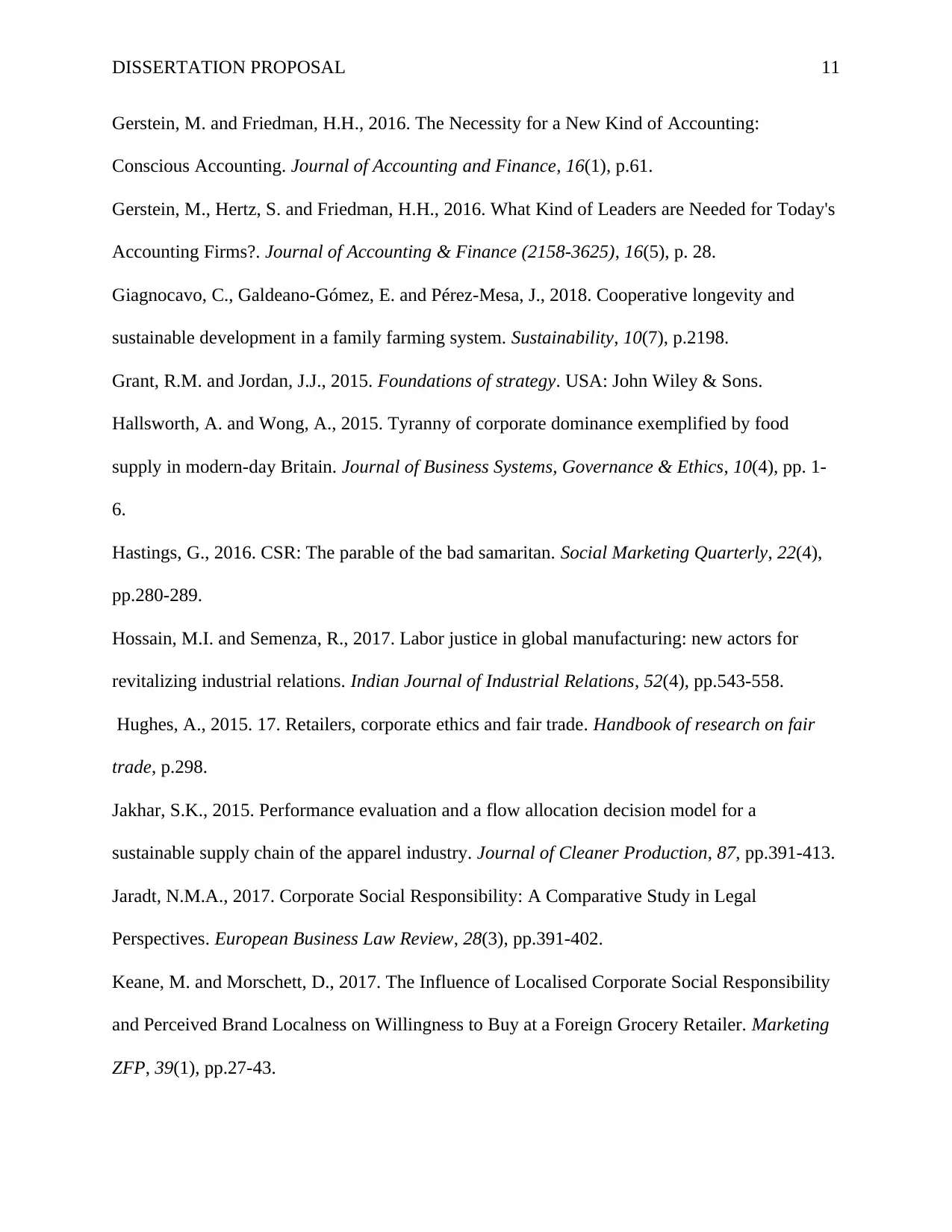
DISSERTATION PROPOSAL 11
Gerstein, M. and Friedman, H.H., 2016. The Necessity for a New Kind of Accounting:
Conscious Accounting. Journal of Accounting and Finance, 16(1), p.61.
Gerstein, M., Hertz, S. and Friedman, H.H., 2016. What Kind of Leaders are Needed for Today's
Accounting Firms?. Journal of Accounting & Finance (2158-3625), 16(5), p. 28.
Giagnocavo, C., Galdeano-Gómez, E. and Pérez-Mesa, J., 2018. Cooperative longevity and
sustainable development in a family farming system. Sustainability, 10(7), p.2198.
Grant, R.M. and Jordan, J.J., 2015. Foundations of strategy. USA: John Wiley & Sons.
Hallsworth, A. and Wong, A., 2015. Tyranny of corporate dominance exemplified by food
supply in modern-day Britain. Journal of Business Systems, Governance & Ethics, 10(4), pp. 1-
6.
Hastings, G., 2016. CSR: The parable of the bad samaritan. Social Marketing Quarterly, 22(4),
pp.280-289.
Hossain, M.I. and Semenza, R., 2017. Labor justice in global manufacturing: new actors for
revitalizing industrial relations. Indian Journal of Industrial Relations, 52(4), pp.543-558.
Hughes, A., 2015. 17. Retailers, corporate ethics and fair trade. Handbook of research on fair
trade, p.298.
Jakhar, S.K., 2015. Performance evaluation and a flow allocation decision model for a
sustainable supply chain of the apparel industry. Journal of Cleaner Production, 87, pp.391-413.
Jaradt, N.M.A., 2017. Corporate Social Responsibility: A Comparative Study in Legal
Perspectives. European Business Law Review, 28(3), pp.391-402.
Keane, M. and Morschett, D., 2017. The Influence of Localised Corporate Social Responsibility
and Perceived Brand Localness on Willingness to Buy at a Foreign Grocery Retailer. Marketing
ZFP, 39(1), pp.27-43.
Gerstein, M. and Friedman, H.H., 2016. The Necessity for a New Kind of Accounting:
Conscious Accounting. Journal of Accounting and Finance, 16(1), p.61.
Gerstein, M., Hertz, S. and Friedman, H.H., 2016. What Kind of Leaders are Needed for Today's
Accounting Firms?. Journal of Accounting & Finance (2158-3625), 16(5), p. 28.
Giagnocavo, C., Galdeano-Gómez, E. and Pérez-Mesa, J., 2018. Cooperative longevity and
sustainable development in a family farming system. Sustainability, 10(7), p.2198.
Grant, R.M. and Jordan, J.J., 2015. Foundations of strategy. USA: John Wiley & Sons.
Hallsworth, A. and Wong, A., 2015. Tyranny of corporate dominance exemplified by food
supply in modern-day Britain. Journal of Business Systems, Governance & Ethics, 10(4), pp. 1-
6.
Hastings, G., 2016. CSR: The parable of the bad samaritan. Social Marketing Quarterly, 22(4),
pp.280-289.
Hossain, M.I. and Semenza, R., 2017. Labor justice in global manufacturing: new actors for
revitalizing industrial relations. Indian Journal of Industrial Relations, 52(4), pp.543-558.
Hughes, A., 2015. 17. Retailers, corporate ethics and fair trade. Handbook of research on fair
trade, p.298.
Jakhar, S.K., 2015. Performance evaluation and a flow allocation decision model for a
sustainable supply chain of the apparel industry. Journal of Cleaner Production, 87, pp.391-413.
Jaradt, N.M.A., 2017. Corporate Social Responsibility: A Comparative Study in Legal
Perspectives. European Business Law Review, 28(3), pp.391-402.
Keane, M. and Morschett, D., 2017. The Influence of Localised Corporate Social Responsibility
and Perceived Brand Localness on Willingness to Buy at a Foreign Grocery Retailer. Marketing
ZFP, 39(1), pp.27-43.
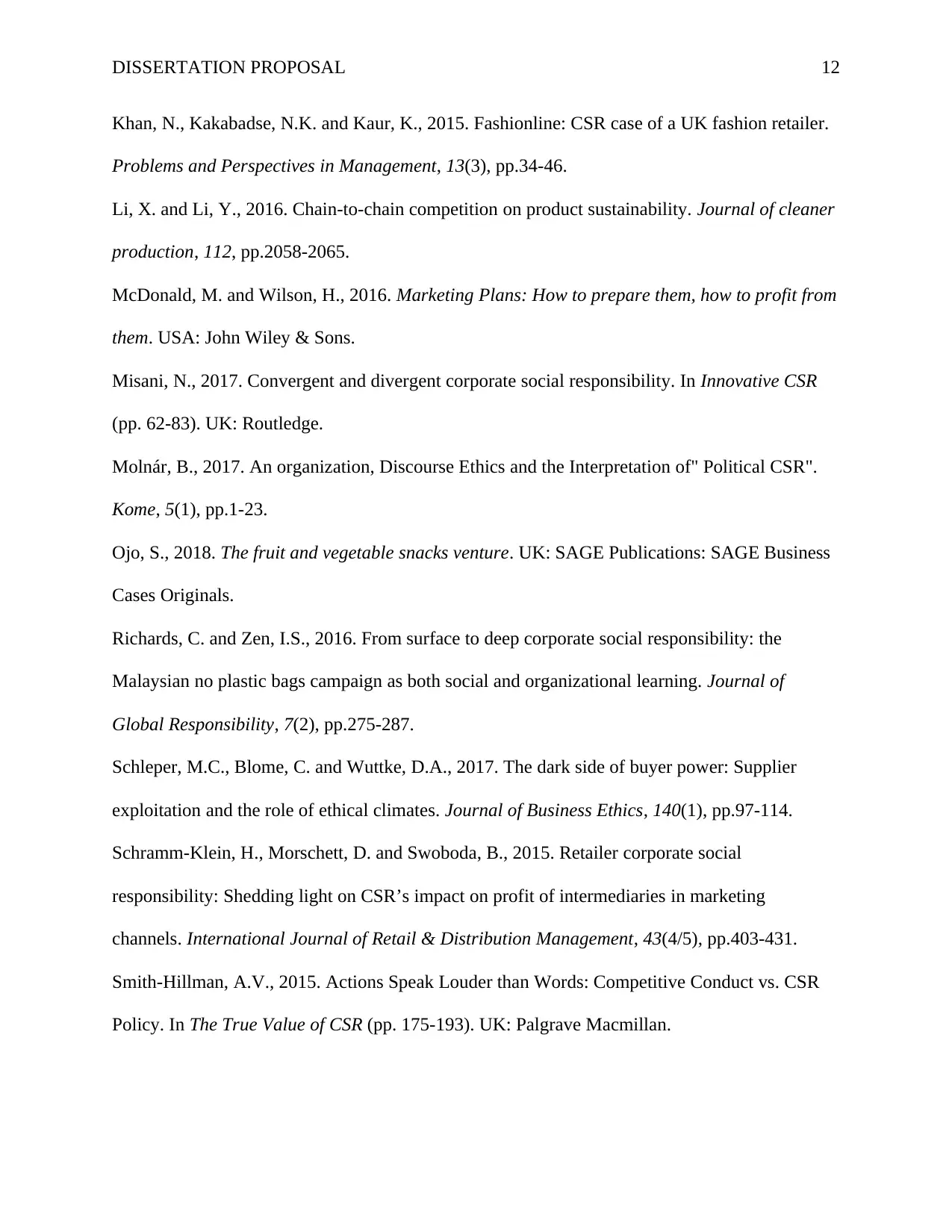
DISSERTATION PROPOSAL 12
Khan, N., Kakabadse, N.K. and Kaur, K., 2015. Fashionline: CSR case of a UK fashion retailer.
Problems and Perspectives in Management, 13(3), pp.34-46.
Li, X. and Li, Y., 2016. Chain-to-chain competition on product sustainability. Journal of cleaner
production, 112, pp.2058-2065.
McDonald, M. and Wilson, H., 2016. Marketing Plans: How to prepare them, how to profit from
them. USA: John Wiley & Sons.
Misani, N., 2017. Convergent and divergent corporate social responsibility. In Innovative CSR
(pp. 62-83). UK: Routledge.
Molnár, B., 2017. An organization, Discourse Ethics and the Interpretation of" Political CSR".
Kome, 5(1), pp.1-23.
Ojo, S., 2018. The fruit and vegetable snacks venture. UK: SAGE Publications: SAGE Business
Cases Originals.
Richards, C. and Zen, I.S., 2016. From surface to deep corporate social responsibility: the
Malaysian no plastic bags campaign as both social and organizational learning. Journal of
Global Responsibility, 7(2), pp.275-287.
Schleper, M.C., Blome, C. and Wuttke, D.A., 2017. The dark side of buyer power: Supplier
exploitation and the role of ethical climates. Journal of Business Ethics, 140(1), pp.97-114.
Schramm-Klein, H., Morschett, D. and Swoboda, B., 2015. Retailer corporate social
responsibility: Shedding light on CSR’s impact on profit of intermediaries in marketing
channels. International Journal of Retail & Distribution Management, 43(4/5), pp.403-431.
Smith-Hillman, A.V., 2015. Actions Speak Louder than Words: Competitive Conduct vs. CSR
Policy. In The True Value of CSR (pp. 175-193). UK: Palgrave Macmillan.
Khan, N., Kakabadse, N.K. and Kaur, K., 2015. Fashionline: CSR case of a UK fashion retailer.
Problems and Perspectives in Management, 13(3), pp.34-46.
Li, X. and Li, Y., 2016. Chain-to-chain competition on product sustainability. Journal of cleaner
production, 112, pp.2058-2065.
McDonald, M. and Wilson, H., 2016. Marketing Plans: How to prepare them, how to profit from
them. USA: John Wiley & Sons.
Misani, N., 2017. Convergent and divergent corporate social responsibility. In Innovative CSR
(pp. 62-83). UK: Routledge.
Molnár, B., 2017. An organization, Discourse Ethics and the Interpretation of" Political CSR".
Kome, 5(1), pp.1-23.
Ojo, S., 2018. The fruit and vegetable snacks venture. UK: SAGE Publications: SAGE Business
Cases Originals.
Richards, C. and Zen, I.S., 2016. From surface to deep corporate social responsibility: the
Malaysian no plastic bags campaign as both social and organizational learning. Journal of
Global Responsibility, 7(2), pp.275-287.
Schleper, M.C., Blome, C. and Wuttke, D.A., 2017. The dark side of buyer power: Supplier
exploitation and the role of ethical climates. Journal of Business Ethics, 140(1), pp.97-114.
Schramm-Klein, H., Morschett, D. and Swoboda, B., 2015. Retailer corporate social
responsibility: Shedding light on CSR’s impact on profit of intermediaries in marketing
channels. International Journal of Retail & Distribution Management, 43(4/5), pp.403-431.
Smith-Hillman, A.V., 2015. Actions Speak Louder than Words: Competitive Conduct vs. CSR
Policy. In The True Value of CSR (pp. 175-193). UK: Palgrave Macmillan.
⊘ This is a preview!⊘
Do you want full access?
Subscribe today to unlock all pages.

Trusted by 1+ million students worldwide
1 out of 15
Related Documents
Your All-in-One AI-Powered Toolkit for Academic Success.
+13062052269
info@desklib.com
Available 24*7 on WhatsApp / Email
![[object Object]](/_next/static/media/star-bottom.7253800d.svg)
Unlock your academic potential
Copyright © 2020–2026 A2Z Services. All Rights Reserved. Developed and managed by ZUCOL.





